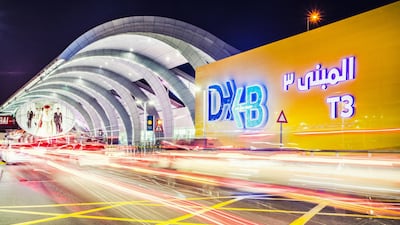Follow the latest updates on the Covid-19 pandemic here
Dubai's airport operator expects a “massive influx” of travellers as Covid-19 restrictions ease and the emirate hosts global events, anticipating passenger traffic at Dubai International Airport (DXB) will reach at least 56 million in 2022, its chief executive said.
The airport expects to handle 27 million passengers this year, 4.2 per cent more than in 2020 and 69 per cent below pre-pandemic levels, as the emirate hosts the Expo world fair in October, the Dubai Airshow in November and the UAE's 50th anniversary celebrations in December, Paul Griffiths, Dubai Airports' chief executive, told The National. The cooler weather during the winter months and established travel corridors are also expected to boost visitor numbers.
“We're bound to get a massive influx of business and we're braced for a very, very significant rebound,” Mr Griffiths said.
“Once the world starts to open up, the importance of Dubai as a transfer hub will once again surge to the fore and I imagine we will see a pretty sharp recovery because so many people are desperate to travel again that they are very keen indeed to make plans as soon as it's clear there are no restrictions.”
Dubai International remained the world's busiest airport for international passengers in 2020, holding the title for seven consecutive years, according to annual traffic rankings by the Airports Council International in April. Global air travel demand is recovering slowly from the Covid-19 pandemic, driven by rapid vaccination drives around the world, though travel restrictions and more contagious virus variants have hobbled the rebound.
While Dubai's passenger traffic figures are “realistic forecasts” that balance sustainable operations with cash flow, the airport operator said it is also “cautiously optimistic” about potentially exceeding its projections for 2022.
“If the world continues to open up and the optimism we're seeing now continues to be founded on a better outlook then we could exceed that,” Mr Griffiths said.
Travel restrictions to the UK and from India, the UAE's top source markets, were relaxed last week. The British government removed the UAE from its red list and upgraded it to amber, while the Emirates eased some restrictions on passengers flying from six countries, including India, Pakistan, Sri Lanka, Nepal, Nigeria and Uganda.
“Although coming off the UK red list was a very positive thing for us, we will not rest until we have completely removed all the travel restrictions around the world in a very safe and responsible way and people have got the freedom to travel as they have in the past,” he said. “This is incredibly important not just for passenger mobility and the aviation industry, but for the social and economic recovery of the world.”
The UK's amber list remains “quite restrictive” for passengers who must still quarantine for five days on arrival and the UAE will continue to negotiate for an upgrade to the green list.
“I'm hoping progress will be swift. We've got some discussions this week which will hopefully get us to where we need to be,” the chief executive said.
The airport also expects a passenger surge following the easing of travel restrictions with India.
“India is our number one market and the opening of restrictions is really good,” he said.
In addition, travel corridors between the UAE and 10 other countries such as Greece, Spain and France, are “beneficial” in boosting travel, he said, noting corridors with Italy and Seychelles have led to full flights to those destinations.
To address the anticipated rebound in travel demand, Dubai Airports will be “selectively hiring again” after reducing its workforce by 34 per cent due to the pandemic, Mr Griffiths said.
The airport operator — which will be “cautious” in its hiring approach until it is “sure and confident” of the passenger traffic figures — has entered into new arrangements to outsource some of its staff, truncate the lines of authority and give employees more authority, according to Mr Griffiths. Any increase in the workforce depends on traffic figures, he said.
The airport, which reopened Terminal 1 in June following a 15-month closure due to the pandemic, is seeing its runways operating at full capacity. While Terminals 1, 2 and 3, as well as Concourses B, C and D are currently operational, it is reviewing traffic figures and may reopen Concourse A at about the 60 million passenger mark, or even sooner, to maintain a higher level of customer service, he said.
Mr Griffiths said airport retail, restaurant and bar spending have “never been higher” as travel-deprived passengers are “taking the opportunity to indulge” in shopping at the airport.
Spending per head at the airport's massive retail outlets has significantly increased compared with 2019 levels, Mr Griffiths said.
The airport handled 10.6 million passengers during the first half of 2021, a 40.9 per cent year-on-year contraction, due to travel restrictions at its key source markets, it said on Wednesday. Passenger volumes in the second quarter totalled 4.9 million.
Mr Griffiths said it was a “disappointment” that other countries change their travel guidelines to become so “complex and restrictive” that a lot of DXB’s major markets in Western Europe and Australasia were closed while the UAE has opened its borders to more countries.
India continued to be DXB’s top destination country by traffic volume in the first half, with passenger numbers exceeding 1.9 million, followed by Pakistan, Russia and Egypt. Other destination countries of note were Ethiopia, Saudi Arabia and the US. The top three cities in terms of traffic were Addis Ababa, Cairo and Moscow.
Cargo continued to outperform passenger operations. DXB recorded 571,568 tonnes of freight in the second quarter, propelling first-half volumes to 1.1 million tonnes, a year-on-year increase of 27.7 per cent.


